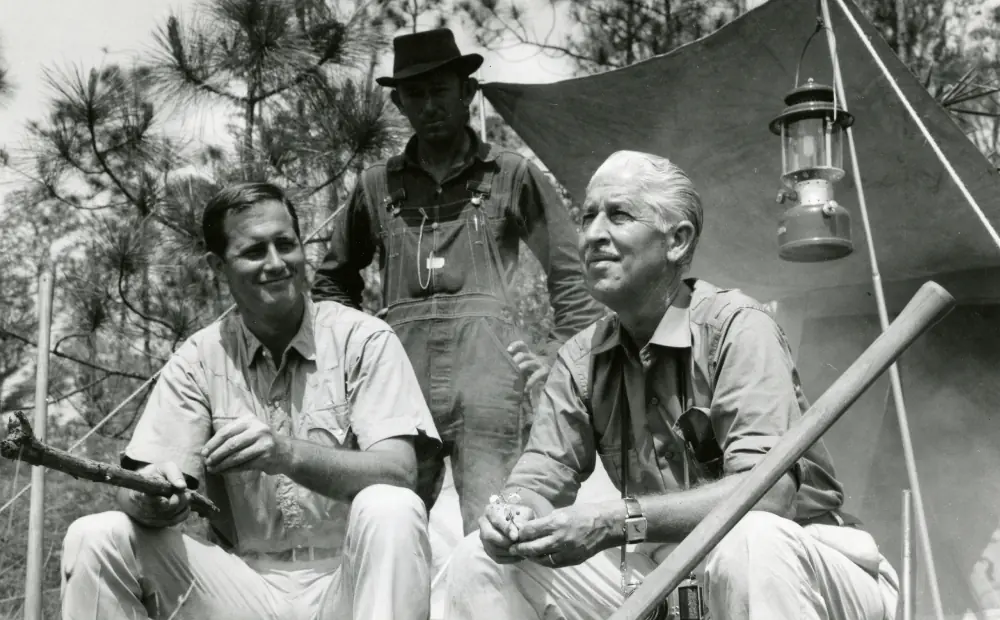With the Tennessee River flowing gently behind them and the sun shining overhead, Mutual of Omaha’s Wild Kingdom Protecting the Wild Co-Host Dr. Rae Wynn-Grant joined hands with the Tennessee Aquarium, Washed Ashore, volunteers from Mutual of Omaha’s local Chattanooga, Tennessee office, and dedicated community members to take action in the fight against plastic pollution.
Together, members of youth summer camps, Mutual of Omaha associates and local volunteers gathered on the riverbanks to clean up trash that could otherwise travel downstream and threaten freshwater and marine ecosystems. What they found ranged from plastic bottles to wrappers, all of which were collected with care and purpose.
“This area has one of the most biodiverse freshwater ecosystems of any temperate region on Earth,” Dr. Rae said. “When we have healthy, thriving freshwater systems, we have a healthier planet. Everything is connected.”
That message of connection and conservation resonated throughout the day and beyond.
A community united for clean water
Wild Kingdom has long been dedicated to raising awareness about protecting wildlife, and the Tennessee River cleanup brought that mission to life. The event was more than just a cleanup; it was an opportunity to inspire action and educate future conservationists.
“Today, Mutual of Omaha’s Wild Kingdom paired with local youth, community groups and Washed Ashore to help clean up the riverbank,” said Brad Parks, conservation/education director at Washed Ashore. “This effort not only made the park more enjoyable but prevented litter from entering the river and ultimately reaching our oceans.” Washed Ashore is a nonprofit that creates sculptures from debris washed up on waterways to educate about plastic pollution.
Inspiring the next generation
After the river clean up, Dr. Rae met with the Tennessee Aquarium’s summer fellows and younger children from the community, sharing her journey and encouraging them to become advocates for wildlife.
“I want young people to see that protecting the wild can start with something as simple as picking up trash,” she said. “It may be hot, dirty work, but it’s important, and it’s rewarding.”
From plastic pollution to powerful art
The day culminated in a meaningful moment: the unveiling of a Washed Ashore sculpture at the Tennessee Aquarium, a traveling piece previously featured in Galveston, Texas and this Wild Kingdom story, “From Trash to Art.” Handcrafted by Dr. Rae, co-host Peter Gros and Brad Parks, the sculpture is made entirely from ocean-bound plastic and features a vibrant coho salmon named Bill. To dive deeper into coho salmon, check out Protecting the Wild, Season 1, Episode 7, “Eager Beavers.”
“Creating this sculpture was emotional,” Dr. Rae said “We walked the beaches of Oregon, picked up buckets of plastic, and turned that frustration into something beautiful. Sorting colors, using power tools, and working with real artists reminded me that there are many ways to make a difference.”
Bill is more than just art. He is a symbol of resilience, a call to action, and a reminder that ocean health starts upstream.
Parks agreed, “Bill helps us think about plastic pollution and the connection between freshwater and ocean habitats. Whether you live on the coast or far inland, your actions matter.”
How you can help reduce water pollution
Join Wild Kingdom and our partners in protecting wildlife by:
- Participating in local cleanups
- Reducing single-use plastics
- Educating others about the impact of pollution on freshwater and ocean ecosystems
Looking for even more ways to make a difference? Check out these five wildlife–friendly New Year’s resolutions that you can adopt year-round.














